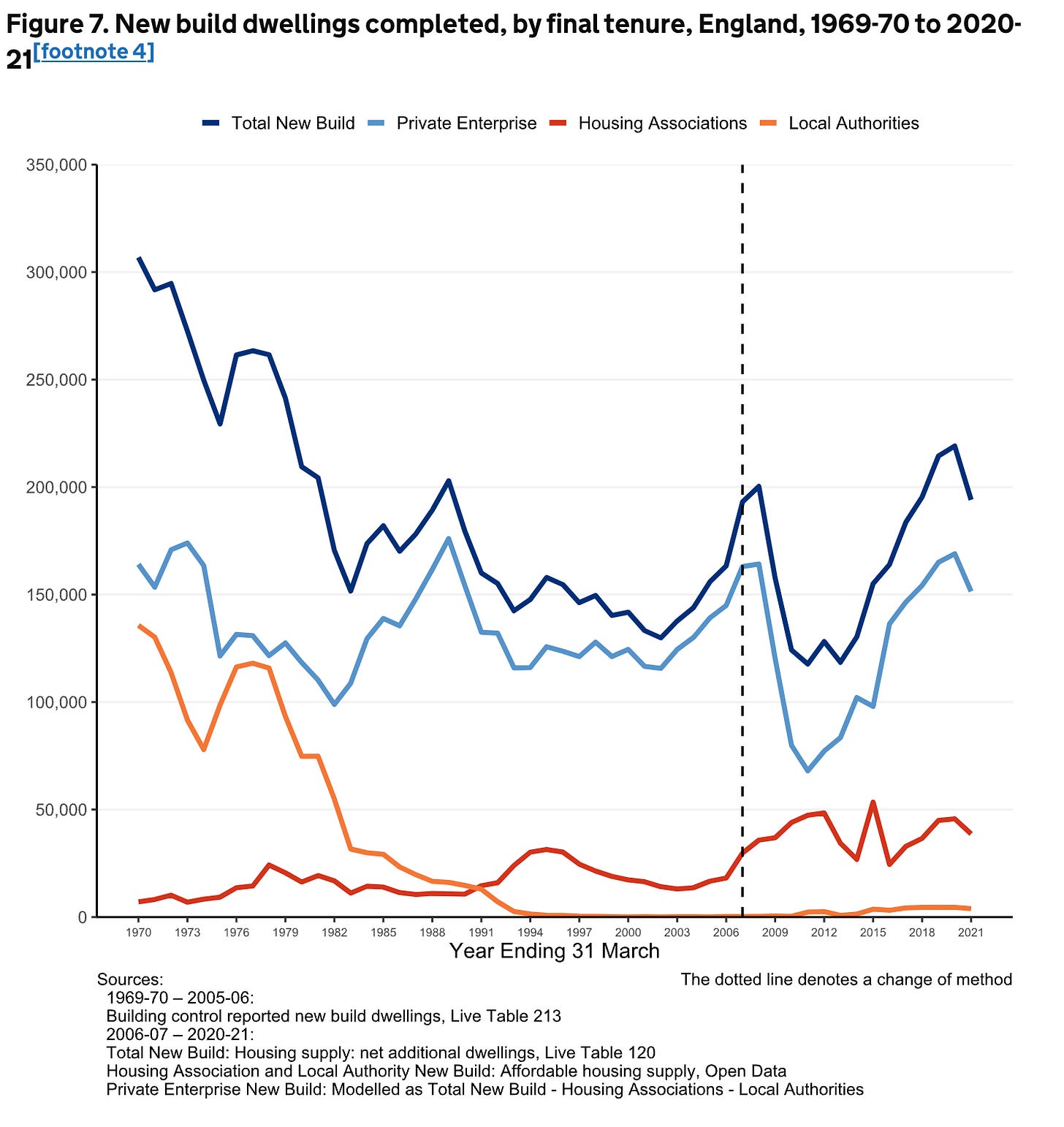It is easy to conclude that Britain’s housing market is broken when you look at the latest news stories and reports. We have articles about how the level of demand to buy properties has tumbled and one in four sellers are having to drop their asking price (not surprising given the economic environment, story here and the full report by Zoopla here), that banks are not passing on a drop in wholesale borrowing rates since the chaos of the mini-Budget to mortgage customers through lower interest rates (Telegraph story here), that the number of new homes in England getting planning permission has dropped to the lowest level in seven years (Telegraph story here), and that the government is set to water down proposals designed to make it easier for new homes to get planning permission (Sun story here)
The backdrop to this, of course, is that housing affordability in the UK is already crippling high. The Office for National Statistics has said that full-time employees could typically expect to pay 9.1 times their annual earnings when buying a home in England in 2021. That is a historic high. This gap between earnings and house prices has been filled by government support schemes - ie Help to Buy - and historically-low interest rates on mortgages. Both have now disappeared. The rental market is not any better. Recent research by Rightmove and Foxtons has found that rents are at record prices in the UK. In London, for instance, they have risen 22 per cent year-on-year and stand at £571-a-week on average according to Foxtons.
Data suggests the UK is not building enough homes and this is exacerbating the expense of buying or renting a property. Labour set a target in 2007 of 240,000 new homes being built every year in the UK. This Conservative government is looking to increase that to 300,000. But according to the ONS, 204,530 dwellings were completed in the UK in the year to March 2022. The last time more than 240,000 were completed in a year was 1989. This is what housebuilding in England looks like over the last 50 years, tracked by the ONS as new-build dwellings completed…
The failings of the planning system get some blame for this. There has been a passionate debate in recent weeks about the planning system because of an amendment tabled by a group of 50 rebel Conservative MPs to the Levelling Up and Regeneration Bill, which aims to boost housebuilding in the UK. These MPs, broadly speaking, want to slow down development in their constituencies. The amendments involve scrapping local housebuilding targets by making them advisory only and removing the presumption in favour of development when local authorities are considering whether to build new homes. The government, led by levelling-up secretary Michael Gove, wants to set a target of 300,000 homes a year being built and has promoted the bill as a way of doing that. It saw local targets and the presumption in favour of development as important to achieving its goals.
As I mentioned in the Sunday press review, Robert Colville wrote in his Sunday Times column last week that the amendments were “wicked” and that MPs who backed them were “spitting in the face of a generation”. Yesterday’s Sunday Times looked at the other side of the debate by running an interview with Rosie Pearson, head of the Community Planning Alliance, a campaign group against new developments. Referring to the criticism of campaigns against development - the NIMBYs, ie “not in my backyard” - she said this:
“It makes me so cross. We’re giving up our time, for free, to hold unscrupulous developers, rogue councils and the government to account. Once you’re putting your heart and your time and probably your money into wanting the best for your community than to be insulted left, right and centre is really galling.”
She goes on to explain how she got involved in campaigning after seeing a leaflet from a developer 12 years ago about plans to build a new town in the Essex countryside, an area she knew well…
“I thought: ‘No way the trains could take all those people’.”
I wanted to flag Pearson’s comments not because I agree with them but because they are, well, not irrational. Indeed, many of those who oppose developments in their area are not being irrational. It is reasonable to want to protect the area that you live in, even if for the UK as a whole, the long-term benefits of a development outweigh the short-term disruption.
And that is the problem with the debate about housebuilding in the UK. If you stand back and look at the issues, each side can argue their position is reasonable given their own interests. It is a system riddled with vested interests and not enough is being done by any side - or the government - to incentivise any shift away from those interests.
For campaigners against development, the interests are usually obvious - protecting where they live and the value of the property. But the other sides have their own interests too. For Britain’s housebuilders it is delivering on their financial responsibilities to shareholders. This is not just about the number of homes they build, but the profit margin that they make on them, which is why “average selling price” features so prominently in the financial results of listed housebuilders. Over the last decade, housebuilders have delivered for shareholders. Look at this graph of how the share prices for the four leading housebuilders - Barratt, Berkeley, Persimmon and Taylor Wimpey - have performed relative to the FTSE 100 over the last decade. The FTSE 100 is the blue line. They have more reason to be happy about the status quo than other sectors…
According to the last set of financial results, Barratt has net cash on its balance sheet of £1.1 billion, Berkeley has net cash of £269 million, Persimmon has £772 million and Taylor Wimpey £642 million. In other words, they are in a healthy financial position.
So, while the different sides of this debate may throw insults at each other - campaigners are short-sighted Nimbys, housebuilders are greedy, local authorities are too slow to make planning decisions because they are understaffed and underskilled - the only way to make notable progress in the long-term is to offer better incentives for each side to shift their position. This could be investment in local infrastructure and facilities to support new homes and existing residents in the area - thereby encouraging Nimbys there are benefits to new developments - financial incentives or penalties for housebuilders to get them to use land, or more control of tax income for local authorities. They are just some broad thoughts. But after years of the UK missing its housebuilding targets, it’s time to accept that fresh thinking is needed…
Podcast…
A reminder that our latest podcast episode featuring Tom Hayes is live. Hayes spent more than five years in prison after being convicted of rigging Libor and is now trying to clear his name. You can listen here on Substack, here on Apple and here on Spotify.
The next episode of Business Studies will be with you tomorrow and it is a cracker. It’s a very different episode to Hayes’s story. The new episode takes a deep dive into the nature of business itself and is a story that poses questions about whether how we judge success is wrong. All Off to Lunch subscribers will be notified when the episode is launched…
Other stories that matter…
McKinsey has revisited some of the predictions it got from the media world about what would make headlines in 2022. Russia and Ukraine are not mentioned, but inflation, energy prices and supply chain disruption featured heavily, a reminder that decision-makers were warned of some of the challenges that were coming (McKinsey)
Rasmus Ankersen is a fascinating character who is the chief executive of the investment firm that owns Premier League club Southampton and used to be the director of football at Brentford. He has also been an adviser to a collection of big companies about elite performance. In a new interview with The Athletic he has spoken about hiring Southampton’s new manager Nathan Jones and why we are too quick to dismiss those who have failed when considering appointments (Training Ground Guru)
The value of rare Scottish whiskies has risen by more than a fifth this year as market uncertainty has highlighted the value of old, high-quality bottles (FT)
The transport situation in northern England is even worse than it looks in official figures because TransPennine Express is underreporting cancellations as train companies do not have to log services that are preemptively cancelled before the day they are due to run (The Guardian)
More on this: business leaders who are part of the Northern Powerhouse Partnership have warned that train services could be “utter chaos” by January (BBC)
There is a shortage of painters in the UK and the company that makes Dulux is worried (FT)
PR firms are divided about the leadership of their global trade association, the Public Relations and Communications Association. Concerns have been raised about governance issues and director-general Francis Ingham’s vocal support for Ukraine (FT)
Bloomberg has noticed that Elon Musk has a habit of tweeting about he agrees with someone’s opinion - his own (Bloomberg Businessweek)
A look at the high-tech gadgets on the Christmas lists of those in Silicon Valley (The Information)
Check-out Off to Lunch’s Sunday press review for a look at what was interesting in the Sunday papers, including Rolls-Royce, Superdry, Brexit and more. You can sign-up to read it here.
And finally…
I am biased about the quality of the local pubs in Cumbria having grown up there, but honestly, whether you are looking for decent ales, traditional pub food or something a bit more restaurant-ey, there is everything you could want. The Observer’s Jay Rayner has just been to one of the best - The Black Bull in Sedbergh - and given it a glowing review. You can read it here. Grace Dent has also been to The Old Stamp House restaurant in Ambleside, which Trip Advisor has labelled the “best fine dining restaurant in the world” and I have mentioned in Off to Lunch before. Given the lofty expectations, I think this is a pretty positive conclusion: “I cannot say empirically if this is the best restaurant in the entire universe, but I know it’s taken the role to heart and is having a very good go.” That review is here
Thanks for reading. If you enjoy Off to Lunch then please share it with others and spread the word. If this newsletter was shared with you then please sign-up below to become a member, get Off to Lunch sent directly to your inbox, attend our forthcoming events and contribute to the work of Off to Lunch
Best
Graham









Evan Davis at BBC Radio 4 had an episode related to this a few months ago: https://www.bbc.co.uk/programmes/m0019kks.